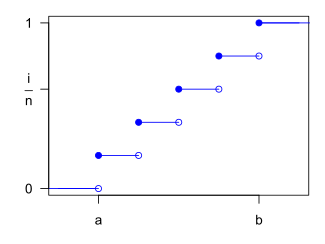This article needs additional citations for verification. (October 2022) |
|
Probability mass function  n = 5 where n = b − a + 1 | |||
|
Cumulative distribution function  | |||
| Notation | or | ||
|---|---|---|---|
| Parameters |
integers with | ||
| Support | |||
| PMF | |||
| CDF | |||
| Mean | |||
| Median | |||
| Mode | N/A | ||
| Variance | |||
| Skewness | |||
| Excess kurtosis | |||
| Entropy | |||
| MGF | |||
| CF | |||
| PGF | |||
In probability theory and statistics, the discrete uniform distribution is a symmetric probability distribution wherein each of some finite whole number n of outcome values are equally likely to be observed. Thus every one of the n outcome values has equal probability 1/n. Intuitively, a discrete uniform distribution is "a known, finite number of outcomes all equally likely to happen."
A simple example of the discrete uniform distribution comes from throwing a fair six-sided die. The possible values are 1, 2, 3, 4, 5, 6, and each time the die is thrown the probability of each given value is 1/6. If two dice were thrown and their values added, the possible sums would not have equal probability and so the distribution of sums of two dice rolls is not uniform.
Although it is common to consider discrete uniform distributions over a contiguous range of integers, such as in this six-sided die example, one can define discrete uniform distributions over any finite set. For instance, the six-sided die could have abstract symbols rather than numbers on each of its faces. Less simply, a random permutation is a permutation generated uniformly randomly from the permutations of a given set and a uniform spanning tree of a graph is a spanning tree selected with uniform probabilities from the full set of spanning trees of the graph.
The discrete uniform distribution itself is non-parametric. However, in the common case that its possible outcome values are the integers in an interval , then a and b are parameters of the distribution and In these cases the cumulative distribution function (CDF) of the discrete uniform distribution can be expressed, for any k, as
or simply
on the distribution's support
















![{\textstyle [a,b]}](https://wikimedia.org/api/rest_v1/media/math/render/svg/2c780cbaafb5b1d4a6912aa65d2b0b1982097108)



![{\textstyle k\in [a,b].}](https://wikimedia.org/api/rest_v1/media/math/render/svg/60c76c64f9215b568bfba43772d8a7dc34c3b5d4)